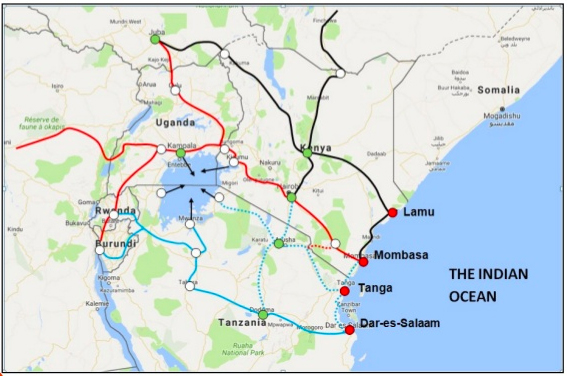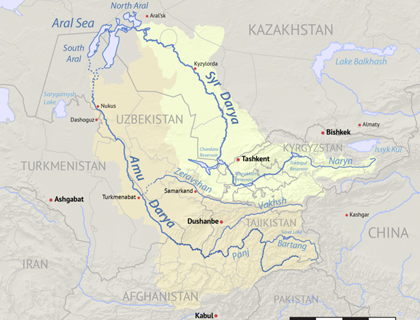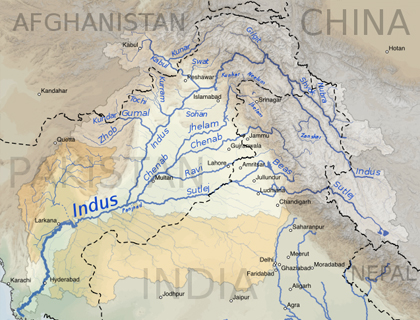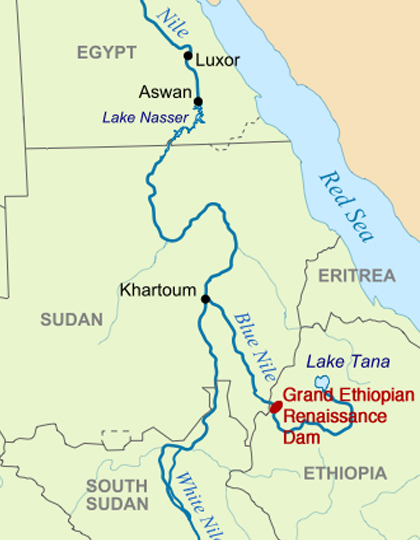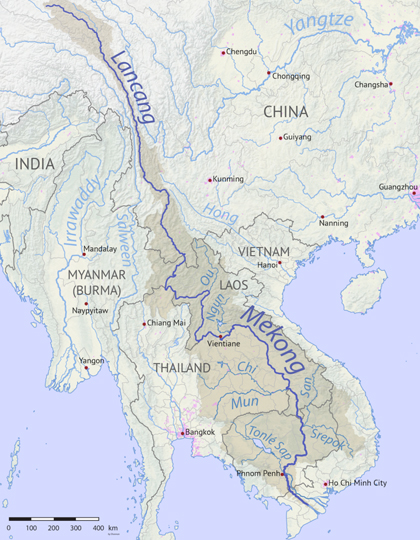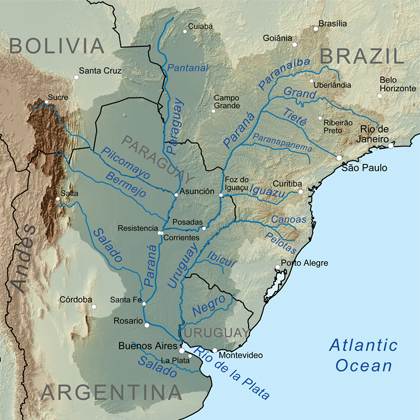Ruta de navegación
Menú de navegación
Blogs
Entries with Categories Global Affairs Africa .
From both shores, the 24 partner countries are seeking greater partnership South-South, but progress is slow
If NATO is in the North Atlantic, in the South Atlantic there is ZOPACAS (South Atlantic Zone of Peace and Cooperation). Without repeating the model NATO's military club, ZOPACAS has as its goal cooperation in subject security and defence, but also the partnership for the development endogenous to the region. Created in 1986, the organization is an interesting forum for addressing common problems, but it lacks mechanisms for greater engagement.
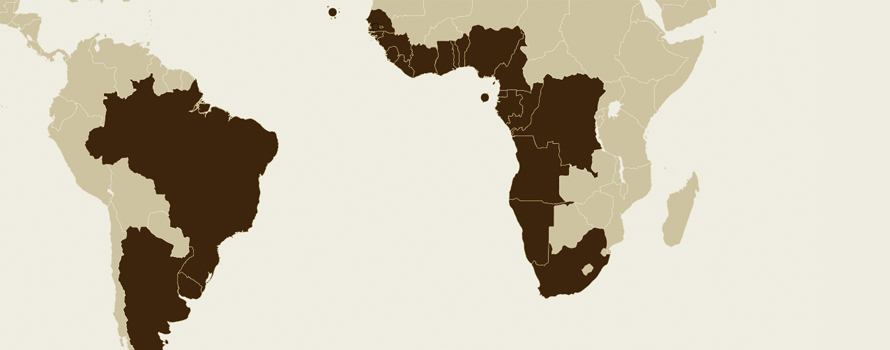
▲ Countries that are part of the Zone of Peace and Cooperation of the South Atlantic [Wikimedia]
article / Alejandro Palacios
In recent decades, the proliferation of South-South cooperation forums has highlighted the desire of many countries around the world to seek their development and the partnership without the tutelage or interference historically exercised by the most industrialized countries. The goal has been the articulation of new forms of association to guarantee the independence of the South in its relations with the North and to promote a genuine development, without incurring the old imbalances.
In this context, the South Atlantic Zone of Peace and Cooperation (ZOPACAS, also known as ZPCAS) was created in 1986 at the initiative of Brazil. It is a transcontinental consultative organization, composed of 24 countries on both sides of the Atlantic,1 and endorsed by the United Nations Assembly in resolution 41/11.
The organization was formed in the final stretch of the Cold War, a time during which some countries sought ways of cooperation outside the bipolar distribution of power between the United States and the Soviet Union. It was also born at a time when Angola and Brazil were becoming important regional players due to the high presence of hydrocarbons in their territories. Hence the need to create greater security conditions in the area so that economic operations by sea could be carried out with as little uncertainty as possible.
However, the growth and development of ZOPACAS was progressive, both in terms of the institutional aspect and in terms of the number of members. Of particular note is the case of South Africa, which did not join the organization until it put an end to its Apartheid policy. The incorporation of South Africa at the Brasilia summit in 1994 increased the prestige of the organization and marked the end of its constitution process.
Even so, ZOPACAS still lacked maturity at the institutional level. In the meeting in Montevideo in 2013, its members agreed to meet annually on the sidelines of the United Nations General Assembly and create a group of contact which, in addition to implementing the decisions adopted in the meetings, also coordinates issues relevant to the area related to peace and cooperation.
In the short term, ZOPACAS made significant progress towards peace and security in the South Atlantic. One of the most noteworthy concerns the signature in 1996 of the Treaty of Pelindaba (African Treaty for training of a Nuclear-Weapon-Free Zone), which made Africa, following South Africa's accession,2 the third nuclear-free zone in the world. The move followed the 1967 Treaty of Tlatelolco, which made Latin America and the Caribbean the first nuclear-free region.
Re-emergence?
Despite his remarkable achievements in subject peace and security, ZOPACAS is currently in a status lack of momentum. While it is true that some analysts speak of re-emergence, others say that in order for the organization to re-emerge it must first undergo an institutional restructuring that allows it to better face the threats and challenges posed by the new geopolitical realities.
As mentioned, the aspirations for the revival of the organization are based on a greater importance of maritime trade, on the exploitation of the new oil fields under Brazil's deep waters (pre-salt layer), and on the need to protect maritime transport against piracy, among other issues. Split the director of the South American Defense School, Antonio Jorge Ramalho, all this is increasing the geopolitical importance of the South Atlantic region, which would make ZOPACAS a "tool ready to be used in case there is a perception of threat in the area" that puts at risk the extraction and trade of the region's raw materials.
However, there are also risks associated with a possible re-emergence of ZOPACAS. Paradoxically, these have to do with greater interference by countries in the Northern Hemisphere, some of which have expressed the intention of extending their area of action to the South Atlantic. France has the purpose to expand its influence from French Guiana, while Russia has already received approval from Equatorial Guinea to use the country's main port.
It is clear that the zone of peace and cooperation has the capacity to counteract that influence, primarily by increasing the partnership among the South Atlantic States. To make this happen, the area It has two defining characteristics: the fact that it is a fairly peaceful area per se and the fact that most of the countries involved have economies based on natural resources and commodity exports. These factors may encourage a cooperation that is more than necessary to fend off the alleged Western interference.
While, therefore, the ability to development of ZOPACAS is clear, it must be borne in mind that the organization does not currently have an institutional structure capable of promote synergies and cooperative practices in an effective way. In fact, some analysts argue that, contrary to what should be happening, countries are showing less and less interest in the project, as evidenced by the frequent absence of country presidents from the meetings of the Organization.
Thus, it can be concluded that both because of the lack of material resources and because of the consultative nature of the organization, ZOPACAS has not been able to project sufficient influence to become a leading organization. reference letter international. He's had more short-term success, in subject peace and security, but it is struggling to establish long-term economic cooperation. Greater commitment is therefore required on the part of the Member States in order to solidify a project necessary not only for peace and security in the region, but also for the political, economic and energy independence of the South Atlantic States.
(1) These are: Angola, Argentina, Benin, Brazil, Cape Verde, Cameroon, Côte d'Ivoire, Democratic Republic of the Congo, Gabon, Gambia, Ghana, Guinea-Conakry, Guinea-Bissau, Liberia, Namibia, Nigeria, Republic of the Congo, Sao Tome and Principe, Senegal, Sierra Leone, South Africa, Togo and Uruguay.
(2) The case of South Africa is interesting because it is the first and only country to date that, after having developed the nuclear bomb, decreed the complete dismantling of its nuclear programme after the signature of the Nuclear Non-Proliferation Treaty in 1991.
essay / Alejandro Palacios
The Republic of Mauritius, an island state of 1.2 million inhabitants in the southwest Indian Ocean, 900 kilometers off the coast of Madagascar, can be seen as a good example of the progress that various African governments are making on subject in the area of human rights. This is not to say that this archipelago is an exemplary country in the application of human rights, as it certainly still has a long way to go in their correct application. But its case is interesting as a country that, despite still being on the way to development, has been able to build a legal system in which respect for fundamental rights plays an essential role.
In this document, accredited specialization will be made on the state of Human Rights in some of the most important areas of political and social life in Mauritius, such as the democratic internship , labor activity or access to drinking water, among others. At the same time, an attempt will be made to answer the question of whether or not the Mauritian legal system is adequate to deal with the fight against abuses and violations of such rights and, above all, whether the Government, in view of the resources available, is capable of doing so. In other words, it will be assessed whether the legal will corresponds to a real will to attack injustices related to fundamental rights.
framework legal
Despite the adoption of the African Charter on Human and Peoples' Rights in 1981 and the creation of the African Commission on Human Rights in 1986, respect for this value system remains the exception in the life of many countries on the African continent. This is due not to an absence of recognition of these rights in the respective national constitutions, but to the lack of both legal mechanisms and political will to effectively implement the law.
Mauritius does not escape this reality. Recently, the Human Rights committee of the Office of the United Nations High Commissioner for Human Rights (OHCHR) presented the fifth periodic report of Mauritius on the implementation of the provisions of the International Covenant on Civil and Political Rights (ICCPR). In its report, the committee highlighted the Mauritian government's lack of political will to develop the principles of democracy, rule of law, human and political rights and individual freedoms.
However, committee noted progress since its previous report, such as the creation of a Human Rights division within the Mauritian government structure and the adoption of theEqual Opportunities Act. Other measures taken forward in Mauritius include certain amendments made to the Civil Code and the adoption of both theCriminal Appeal Act and thePolice Complaints Act. These actions are intended to achieve in the long term deadline a development consistent with respect for human rights and individual freedoms in order to conform to quality of life standards based on dignity, social justice, economic empowerment and equality attention. According to the Government, this will help create a cohesive and tolerant community based on a set of shared values such as respect, unity, inclusion and solidarity.
In addition, Mauritius claims to have implemented in its laws many of the instruments agreed upon at the international level with a view to guaranteeing human rights. Among other actions, the Government highlights the reclamation of the Chagos Archipelago from the United Kingdom. In the opinion of the Mauritian Government, the archipelago was forcibly evicted by the United Kingdom, showing a "clear indifference" towards the rights of the islanders. Since then, the Republic has maintained an unalterable attitude in favor of the decolonization process. The international support that Mauritius has received has already been reflected in the adoption of resolution 71/292 of the United Nations General Assembly on the request to the International Court of Justice for an advisory opinion on the legal consequences of the separation of the Chagos Archipelago from Mauritius in 1965.
Social and political life
Both the Mauritian Constitution of 1968 and the legislation adopted subsequently incorporate formulations of respect for human rights. However, as in many other countries, the institutional system lacks the tools and the will to effectively enforce punishments for human rights violations or negligence. In addition, there is a lack of an adequate system of protection for victims of various crimes, such as sexual offenses or discrimination against homosexuals.
It should be emphasized that not all areas are governed by patron saint . There are other areas in which legislation protects and respects fundamental rights. Therefore, it is convenient to analyze the cases individually rather than to provide a general evaluation of the state of Human Rights immediately.
We will start by making accredited specialization to the state of democracy in the island country. According to the 2017 Democracy Index, Mauritius is within what is considered a "full democracy", with scores higher than Spain, the United States or France, among others[1]. This ranking means that in Mauritius: 1) truly free and fair elections are held; 2) voters are guaranteed security staff ; 3) there is little influence by foreign powers on the government; and 4) civil servants are capable of implementing policies. All this at Degree higher than the 178 countries below Mauritius.
However, there are some internal criticisms of the country's democratic functioning. Although the 2014 elections were characterized by international observers as fair and free, some voices have criticized the system of representation, citing the modification of certain electoral constituencies in order to benefit certain social groups, a technique known in political science as gerrymandering. Other complaints have referred to the low issue of women candidates, the lack of transparency in the counting of votes due to the fact that this process takes longer than it should and the lack of equity in the access to the media to promote the electoral campaigns by the civil service examination. In this sense, the civil service examination alleges that the public television MBC TV favors the ruling party.
Finally, thanks to a 2012 resolution by the United Nations Human Rights committee , the Mauritian government amended the Constitution in 2014 to prevent voters from having to identify their ethnicity when voting. This behavior was reported by the committee as a clear violation of the International Covenant on Civil and Political Rights.
Despite these criticisms, it is relevant to highlight the fact that Mauritius ranks 54th out of the 176 countries analyzed in terms of the Corruption Perceptions Index. Indeed, Mauritius is the African country with the lowest reported levels of corruption, surpassed only by Namibia, Rwanda and Botswana[2]. However, the existing levels of corruption have not come without consequences. In 2015 the President of Mauritius, Ameenah Gurib-Fakim, the only female president in Africa at the time, was forced to resign after being embroiled in a political scandal also involving the NGO Planet Earth Institute[3].
The death penalty was officially abolished in 1995, the last execution having taken place in 1987[4]. Despite being a relatively recent date, Mauritius is one of the few countries in sub-Saharan Africa to have abolished it. Botswana, Zimbabwe, Tanzania, Zambia, Lesotho and Swaziland are some of the neighboring countries that still apply the death penalty in one way or another[5].
partnerMauritius prohibits abortion except in case of serious risk to the mother's life, and therefore abortion is not allowed in case of fetal defects, non-serious risk to the physical or mental health of the pregnant woman, economic factors, or in case of rape[6].
Although there are situations of human rights abuses, the government's attitude is to accept mechanisms to monitor its work, some of them external. Mauritius has an ombudsman or ombudsman elected by the country's president, whose job is to investigate complaints against public servants, such as police and prison officials. The 2017 report on Human Rights in Mauritius considers the ombudsman to be independent, effective, and adequately resourced to carry out his or her work.
In addition, the Government has the Equal Opportunities Commission, which is tasked with investigating allegations of discrimination and promote equal opportunities in the public and private sector. According to the 2017 report , the Commission proves to be effective, independent and adequately resourced to carry out its duties.
All these controls, however, do not prevent discrimination among Mauritian citizens on the basis, among others, of gender and belonging to a specific community. This is the scenario in which the Creoles, i.e. Mauritians of Mauritian origin of African descent, find themselves. In this regard, the newspaper L'Express recently announced that it was in possession of a recording in which the former Vice-President and Minister of Housing and Land could be heard saying that, within the new urban planning project that the Government was going to develop, 90% of the housing would go to Hindus and 10% to Muslims. Consequently, the Creoles would not receive "any housing" in order to prevent "prostitution from spreading in the neighborhood". It should be noted that the Hindu ethnic group constitutes 48% of the Mauritian population and has been politically dominant since the country's independence.
In addition, women and children continue to be the groups most affected by discrimination. There are laws that prohibit and criminalize both rape and domestic violence, but neither the police nor the judicial system provide adequate coverage for these cases. The same is true for cases of sexual harassment. Cases of sex trafficking of minors have been reported (the minimum age for consensual sex is 16 years old).
People with disabilities also suffer from a certain Degree of discrimination. Despite the fact that Mauritian law requires that people with disabilities constitute a specific percentage of the workforce of work within a business, the authorities ignore this requirement. However, the Executive is responsible for financing programs for these people at financial aid , in order to facilitate their access to information and communication. For example, by adding subtitles to television programs or by creating a news program adapted to their communication difficulties. Finally, despite equal rights in terms of political participation, there are practical problems related to transportation and access to polling stations.
Likewise, the LGTBI collective suffers a high level of discrimination attention . For example, in practical terms, those who have had sex with other people of the same sex are prevented from donating blood, even though the law allows it. In addition, in 2015 there was a reported arbitrary arrest of a man for being transgender and externalizing it by wearing women's clothing. He was released without charge after being slapped, terrorized and forced to undress. One of the latest reported incidents was stone throwing during the annual LGTBI march. Despite these cases, the law does not criminalize same-sex sexual activity, but sodomy between people of the same and different sexes.
All these types of discrimination also carry over into the workplace where, despite being prohibited by law, discrimination on the basis of sex, race, HIV and disability exists. For example, Creoles and Muslims have difficult access to work positions in the public sector. In addition, women are paid less than men for a similar work and it is uncommon for them to occupy high positions. On the contrary, they tend to occupy positions where lesser training is required. The high Degree unemployment rate among the disabled is due to the lack of physically accessible work positions. Finally, minors are prohibited by law from working until the age of 16, and until the age of 18 in jobs classified as dangerous and with poor sanitary conditions. Nevertheless, there are cases of minors working on the streets, in small businesses and restaurants, as well as in the agricultural sector.
The minimum wage, which tends to rise in relation to the inflation rate, varies according to the sector. For example, for a domestic worker the minimum wage is 607 rupees (€15) per week, while for a factory worker it is 794 rupees (€20). The working week is stipulated at 45 hours. Despite these regulations, cases have been reported in which cleaning workers were not always paid the minimum wage for the entire conference work , as they only received 1,500 rupees (38 €) per month, which is equivalent to 375 rupees (9 €) per week.
On the other hand, the law recognizes the right to strike, although it is necessary to follow a mandatory process considered by the conveners of the strike as "long, complex and excessively long" in order to declare it. Even if the workers have complied with this process, the Executive reservation has the right to prohibit the strike and transfer the dispute to arbitration if it considers that the strike may seriously affect a specific sector or service. In addition, it is necessary that workers comply with a minimum of their services during the strike days. Strikes at the national level, referring to "general economic policy issues" and/or during sessions of the General Assembly, are prohibited. Labor is one of the few areas where the Government enforces the law more effectively. However, delays in procedures and appeals have been reported.
In relation to access to drinking water, no major problems have been reported. Although it is always advisable, not only in Mauritius, but also in Africa in general, to use bottled water for human consumption. In this regard, only in the Democratic Republic of Congo, Mozambique and Papua New Guinea have serious problems with drinking water supply been observed. However, there is concern about the contamination of the aquifer in northern Mauritius, which is one of the five major groundwater reserves and provides 50-60% of the water needed for domestic purposes.
Good prospects
In conclusion, the efforts that the island government is making to put an end to situations that run counter to respect for fundamental rights should be emphasized. There is no doubt that, despite these efforts, Mauritius still faces many challenges. Many of them are caused by the lack of rigor in the application of Mauritian laws, which are, as noted above, exemplary in the respect and promotion of these rights.
In fact, Mauritius has legislation that, as we have seen, closely resembles that of developed Western countries at subject of respect for individual fundamental rights. One of the most serious problems facing the country in this regard is the lack of political will to implement the precepts of the law.
Despite the shortcomings pointed out by the above-mentioned reports, they also highlight the structural reform carried out and the assertive attitude of the Mauritian government in favor of the implementation of policies that are more respectful of fundamental rights. This is clearly seen in the honesty with which the Government allows third party institutions to exercise some monitoring activity.
development We are also talking about the fact that Mauritius is the African country with the highest Human Development Index (HDI), 0.781, classified as "high"[8]. This status places it as the issue 68th country in the world, above countries such as Ecuador, China or Turkey. Therefore, we can consider that Mauritius meets more than acceptable standards in subject of Education, health, life expectancy or GDP per capita.[9].
On the other hand, this island state is one of the few to provide teaching up to university level, free school transport and free health care. In addition, 87% of its inhabitants own their own homes, without having experienced a real estate bubble like the one that hit Western countries more than 10 years ago, the consequences of which are still being felt. Mauritius has achieved all this without being among the richest countries in the world (129th out of 189 analyzed by nominal GDP)[10]. This has been achieved through a diversification of its Economics, large cuts in defense and a very well structured social security system.[11] The Mauritius government has also been able to achieve this through the diversification of its social security system.
This leads to the conclusion that, despite the efforts that remain to be made at subject to promote and respect human rights, Mauritius is today one of the most economically prosperous African countries and therefore the most likely to see the early institutionalization and entrenchment of fundamental rights and freedoms. Indeed, Mauritius currently enjoys an annual growth rate of close to 4% and one of the highest GDP per Purchasing Power Parity (PPP) indices on the African continent, second only to the Seychelles[12]. This is significant, as one of the most important steps towards the respect of fundamental rights and freedoms is the economic empowerment of the population in order to put an end to cases of servitude and dependency, which undoubtedly encourage cases of abuses and violations of these rights.
[5] It is fair to mention that Zambia and Tanzania are currently in the process of abolishing the death penalty.
development [9] The Human Development Index (HDI) is an indicator developed annually by the United Nations Development Program (UNDP) development and is one of the most important in assessing whether government wealth has translated into higher living standards for its inhabitants.
essay / María Estrada
development One year after the ruling of the African Court of Human Rights recognizing the Ogiek's right to their land - long since seized by the Kenyan government for logging - it may be timely to review the legal basis for the collective land rights of indigenous peoples and how their recognition can contribute to the achievement of the Sustainable Development Goals 2030 (SDG 2030).
The Ogiek are a hunting and gathering people who since ancient times have inhabited the Mau Forest in the Tinet Forest in Molo, Nakuru District. Their existence and continuity depend on the forests because of the close social, spiritual and cultural ties that bind them to them. The May 2017 ruling handed down by the African Court of Human Rights forced a change of attitude on the part of the Kenyan government. The Court based its ruling on the Declaration on the Rights of Indigenous Peoples adopted by the United Nations in September 2007, in whose vote Kenya abstained.
The United Nations Declaration recognizes the right of indigenous peoples to preserve and strengthen their own institutions, cultures and traditions and to work for their development of agreement to their aspirations and needs. In its preamble, the text recognizes "the particular contribution of indigenous and tribal peoples to cultural diversity, to the social and ecological harmony of humankind and to international cooperation and understanding". development It is also worth considering agreement 107 of the ILO of 1957, which states: "The Declaration of Philadelphia affirms that all human beings have the right to pursue both their material well-being and their spiritual welfare in conditions of freedom and dignity, of economic security and equal opportunity".
International law distinguishes between the notions of "land" and "territory" to highlight the difference between a given physical or geographic space (the portion of land itself) and the reproduction or manifestation of the cultural life associated with that space. This cultural life is expressed through different cultural patterns linked to ways of using the land and its resources, ceremonial and spiritual ties and multiple ways of being and conceiving the habitat and the world. The notion of territory does not protect an economic value, but the value of life in general and of cultural life in particular. What is then the amount of land that should be legally regularized in favor of a given people or community? The lands to be handed over must respect the criteria of suitability, sufficiency and traditionality. In other words, they must be of sufficient size and quality to allow the people or community to develop their life plan, in accordance with their options and priorities of development, to live with dignity as an organized people in accordance with their cultural identity, and to guarantee their historical and cultural continuity. The notion of traditionality defines as belonging to a community those territorial spaces that are in the collective report of current generations and that are still recognized as the natural habitat of the people in question, whether it is entirely under their control or has been subject to usurpation and dismemberment in recent years.
Based on these concepts, international law and the domestic legislation of the countries have defined that the right to land and territory implies: a) the submission of lands that are used by the people and community, respecting the different modalities of land and resource use; b) the restitution of lands involuntarily lost and to which they have traditionally had access, and c) the submission of additional or complementary lands to ensure the development and continuity of the people or community.
In addition to these sources of international law, there are other initiatives that would inevitably have led to the triumph of the Ogieks, thanks to the changes that global geopolitics has been undergoing in recent decades.
Firstly, more and more states in the international community are joining the initiatives of sustainable development models, either under pressure from non-state actors such as NGOs or activist groups, or on their own initiative, as governments realize that it is essential to include environmental security in their defense policies. In the field of strategic programs of study , international politics has been dominated since the Cold War by the realist current. This current has a very narrow vision, and considers war and conflict as inherent features of the international system. States are the main actors, and their goal is the accumulation of power, defined in terms of military capability. This approach has remained predominant even after the fall of the Berlin Wall and the end of the Cold War, although new perspectives have gradually been introduced. New currents have emerged that criticize the limited vision of the traditional currents, arguing that there are other non-military factors that are relevant when it comes to recognizing threats to the security of nations and individuals. Several authors, such as Dalby, Floyd or Mathew, among others, believe that it is necessary to begin to include and give priority to environmental security in the international diary ; in other words, to "securitize" the topic. source Some seven million people die every year as a result of climate change, and resource scarcity is often a source of conflict, especially in the least developed countries.
Secondly, in 2015, the Sustainable development Goals (SDGs) for 2030 were announced, which are grouped into 17 goals and 169 targets. These were proposed in 2014 at the United Nations lecture "Transforming our World", which analyzed the results of the Millennium development Goals (MDGs) of 2000. The MDGs achieved progress in areas such as reducing the issue number of people below the poverty line, but in other areas such as the environment there were setbacks. This time, the SDGs put on the table a more integral and comprehensive diary and have sustainability as a central element, ensuring equitable growth. The great challenge in this case will be their implementation, since the goals are not entirely clear and do not require specific commitments, so there is a risk that states will shirk their commitment. Among the established objectives, two are worth mentioning for the topic we are dealing with. The goal 13 speaks of "taking urgent action to combat climate change and its impacts" and the goal 15 of "protecting, restoring and promote the sustainable use of terrestrial ecosystems, sustainably managing forests, combating desertification, halting and reversing land degradation and halting biodiversity loss". The sustainability strategy proposed by the SDGs includes maintaining the integrity of ecosystems through an efficient management of natural resources and a decoupling of environmental pressures from economic growth.
That said, and returning to the Ogiek, there are those who claim that their establishment in the Mau forest can help the conservation of the space, which would be in line with goal 15. The Ogiek consider themselves the guardians of the forest, and believe that it is their duty to contribute to the conservation of the forest and all the species that inhabit it. In African culture - without trying to overgeneralize - the link with the land is more than historical and cultural, it is also a spiritual link. It is there where their ancestors reside, whose spirits guard the people. In addition, one of the main activities of the Ogiek is the production of honey. Therefore, the free disposal of the forest by the Kenyan government would mean the moral and existential uprooting of these people, in addition to other serious consequences for climate change. The forest largely prevents droughts and financial aid to the cohesion of the soil.
In addition to this, we must also take into account the unsustainability of the current capitalist production and consumption model , which only generates inequality through a ferocious skill that is unfair to the most marginalized groups such as indigenous peoples. The Kenyan government justifies uncontrolled logging as necessary for development and income generation. However, other lifestyles must be considered, which in their own way allow for an equally comprehensive development for the people. In addition to preserving diversity and promote cultural enrichment, the lifestyle of the Ogiek people would be the solution for the sustainable development pursued by the SDGs.
In light of this case, it is necessary to raise the idea that perhaps elsewhere on the planet the solution for the conservation of the environment and species is to let the locals who know the land take care of it. This issue concerns many groups of people. In Latin America, disputes are frequent because of abuses by political entities against indigenous peoples, who likewise go to court to seek protection of their rights (to give examples). It is therefore likely that the imposition of a capitalist model without strong social considerations will be counterproductive in terms of achieving development, considered as that which raises people's standard of living. New steps must now find their basis in a broader conception of development, taking into account the diversity of lifestyles in the world, and seeing in the willingness of indigenous peoples to live in and protect forests an opportunity that guarantees forest conservation.
Kenya has the first section of the new railway network financed with financial aid from Beijing.
Africa's participation in the New Silk Road promoted by China involves connecting the hinterland of several East African countries with the main ports on their Indian coast. The designed railway network , which introduces standard gauge in the region, has begun to operate between the two main cities of Kenya: Nairobi and the port of Mombasa. But the full realisation of the project is subject to the questionable model of Chinese investment.
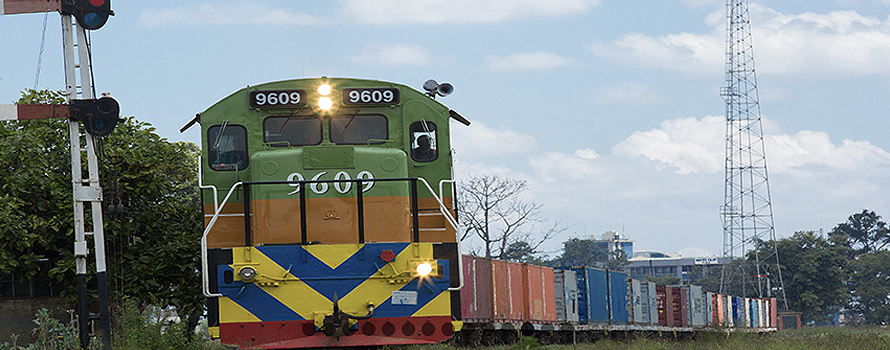
▲Freight transport between Nairobi and Mombasa [Kenya Railways] ▲Freight transport between Nairobi and Mombasa [Kenya Railways].
article / Claudia Correa and Alexia Cosmello
Sino-African relations date back to the 15th century when Zhang, the navigator and trader, arrived on the shores of Mozambique. However, it was with Mao Zedong in 1949 that real relations were established. With promises of respect and taking into account the wounds left by colonisation, China has economically assisted Africa to become its main economic partner since 2009. Through the implementation of economic and technological cooperation projects, it has financed the construction of hydroelectric power plants, dams, airports, aqueducts, hospitals, refineries, gas pipelines, railways and highways in 52 of Africa's 54 countries.
Cooperation between China and Africa has grown considerably. Since 2000, ministerial conferences of the Forum on China-Africa Cooperation (FOCAC) have been held, increasing trade and partnership in areas such as Education, science, technology and health. On the other hand, in terms of lending and investment, China has announced that it will allocate a large part of its capital to projects on the African continent. In 2013, for example, Chinese President Xi Jinping pledged €14.4 billion for infrastructure built by Chinese companies, while in 2014 Premier Li Keqiang announced that China would allocate an additional €8.6 billion to development projects in Africa.
China's rise and intention to broaden and deepen its influence in the world has been very clear in recent years. In September 2013, Xi Jinping presented a new public works expansion project called the New Silk Road. With the goal to gain a foothold in world trade, China aims to improve Asia's connections with other regions by building land routes and articulating a sea route to facilitate trade. Although it is an initiative that will be useful for the international community, it is important to stress the benefits for Africa, since the East African transport route network will be built on its territory, which will give that part of the African continent greater access to world trade, as well as new infrastructure with cutting-edge technology.
Standard Gauge Railway
The network East African freight and passenger goal is intended to connect Kenya's major cities with Uganda's capital Kampala, Burundi's capital Bujumbura, South Sudan's capital Juba and Rwanda's capital Kigali. It is planned to apply standard gauge to most of the route, so the project is known as Standard Gauge Railway (SGR). It is estimated that the network railway will be around 2,935 kilometres in total and will cost around $13.8 billion. position The majority of the financing will be provided by the Chinese government, with financial aid and EiximBank, which will finance 90% of the construction costs, while the Kenyan government will finance the remaining 10% only. The work will be carried out by the Chinese business Road & Bridge Corporation, which is considered to be the most entrepreneurial public business presence in Africa.
The first phase of project, called the Madaraka Express, is now complete and was inaugurated in May 2017. The initiative involved the construction of a railway line to link Nairobi, the capital of Kenya, with Mombasa, the most important port city in Kenya and East Africa. The train can carry 1,260 passengers over a distance of approximately 470 km. With one of the key parts of the network transport network already built, it is possible to continue with the project and move on to the second phase, which will consist of extending the railway lines to the rest of the cities mentioned above.
|
project of the new railway network [Kenya Railways]. |
China's Investment Challenges
What are China's purposes for investing in Africa? It probably does so because it is a large potential market for the sale of its products, as well as a large source source of natural resources. In East Africa, for example, there is oil in Kenya or materials essential for mobile phone batteries in Malawi. In any case, it is clear that this is not a charitable act on the part of the Chinese, as it has been shown that Chinese banks and companies offer financing because it allows them to secure a larger market share in Africa as part of their strategy to go global.
According to Chinese Premier Li Keqiang, "cooperation with Africa is based on respect, equality and mutual benefit". African representatives are enthusiastic about China's investment in Africa's development . The Kenyan president declared that the new train will "revolutionise the region's Economics and reaffirm Kenya's status as an economic hub", and Malawi's ambassador Wang Shiting expressed his thoughts on Africa's development , posting that Africa will only improve when everyone contributes to its development, and that is precisely what China is currently doing.
According to agreement with these official views, from the African point of view, China's intervention on the continent is not seen as negative. However, it does present certain problems, such as the suspicion and accusation of corruption by Chinese investors or the claim that it is aggravatingly widening the economic gap between the more and less well-off, as Chinese investors understandably expect to do business with the continent's elites. There is also the mistreatment of the environment, such as the controversy over the environmental impact of the aforementioned network railway, especially in Kenya, where people have questioned the route through Nairobi Park because of the environmental impact.
It is not only Chinese companies that are investing on the African continent; some Western and European companies have, in some cases, replaced Chinese companies. A prime example is the US multinational General Electric, which in just one year has tripled its workforce in Nigeria, Kenya and Ethiopia. This is possible as a result of the delays or paralysis that some projects have suffered due to the sudden drop in raw material prices and the Chinese slowdown. Thanks to this, some African states with sufficient financial structure have taken the initiative themselves not to let the projects be buried.
The deployment of nearly 19,000 peacekeepers has reduced violence, but human rights violations continue
President Joseph Kabila's leverage of power and social and tribal resentment have fueled violent conflict inside the Democratic Republic of the Congo over the past year and a half. So far, 3.9 million people have been displaced; In 2017 alone, 3,300 deaths were recorded. The UN intervention has reduced the levels of violence, but the conflict in Kasai province is still alive.
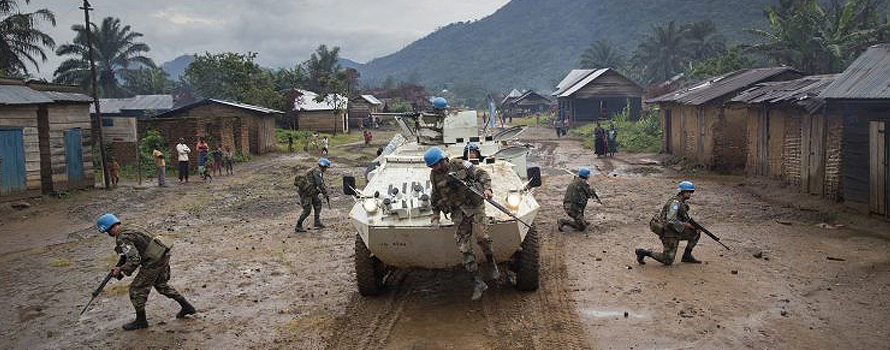
▲Forces of the mission statement UN Stabilization Agency in the DRC [MONUSCO/Sylvain Liechti]
article / Eduardo Villa Corta
The Democratic Republic of the Congo (DRC) is in the midst of a major civil crisis that has been going on for a long time. While this country has had numerous internal problems and conflicts, the one in the Kasai region, in the south-central part of the country, stands out for its high issue of deaths and human rights violations.
The origin of this conflict dates back to 2016, when President Joseph Kabila, in power since 2001, decided to delay the elections in order to remain in power longer. The death of his main opponent, Étienne Tshisekedi, facilitated Kabila's intentions to remain in the presidency, but he has since had to confront a civil service examination Kamuina Nsapu's militia.
To understand the status It is necessary to start from the tribal division present in the DRC. Territorial chiefdoms and divisions are administered by a traditional chief and his committee. These hereditary lines follow a succession process, which must be ratified by the Ministry of the Interior. In the case of the Kamuina Nsapu tribe, in January 2012 there was a problem with the access to the leadership of Jean Pierre Nsapu Pandi, because the Ministry of the Interior (appointed by Kabila) did not recognize the new leader. After some time, he received word that the Ministry had selected another chief from outside the tribe. This selection generated resentment that led to a revolt. From that moment on, Nsapu Pandi decided to start recruiting people in the area.
Among the reasons why this movement grew and expanded in the region is in the first place the status of widespread poverty. Given low living conditions and low economic growth, the leader's promises were a popular incentive. The knowledge of the language Local Tshilub and the Charisma itself staff Nsapu Pandi also helped him gain supporters, so that by the end of July 2016 some 800 young people were following him. It was then that the militia, called Kamuina Nsapu out of devotion to their leader and guide, the revolt began, with the burning of a police station 20 kilometers from the city of Tsimbulu.
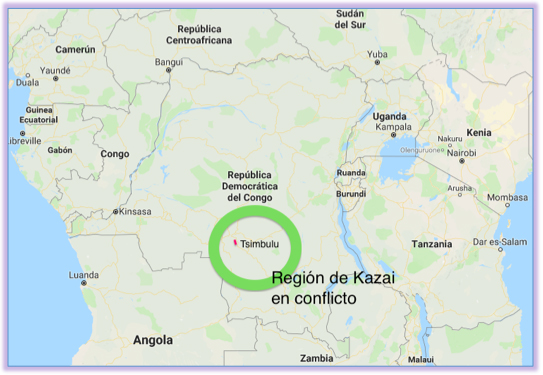 |
The conflict took a leap a few weeks later, when a clash broke out between police and military in Tsimbulu. The episode ended with Pandi's death order in combat, given by the president himself. From that moment on, the newly formed militia was grouped with the civil service examination Kabila and went from being a group to become a national one. It is now a militia in civil war with the government, in a confrontation that has devastated the Congolese population.
The Kamuina Nsapu militia and its atrocities had a swift response from Kabila. The latter responded with disproportionate and disproportionate force, since in their actions against the militia the authorities caused some 400 deaths in the first weeks, both among armed elements and among the civilian population. The group has grown exponentially due to the strong civil service examination Kabila, who nevertheless continues to hold power in Kasai to this day. Both sides of the conflict have been involved in atrocities and serious human rights violations.
The data about deaths and harm to people are not easy to obtain. According to sources in the Catholic Church, in 2017 alone the conflict caused at least 3,300 deaths. That same year, 1.7 million people left their homes and moved to neighbouring countries in search of asylum. To date, a total of 3.9 million people have been displaced. The conflict has exacerbated famine in the country, which has reached 7.7 million people. Of these, 3.3 million are located in the Kasai region, which is the hardest hit by the conflict. In January 2018, it was estimated at 400,000 issue of malnourished children. The numbers are only rising due to migration and the status of danger suffered by thousands of people. The DRC has order the World Bank $1.7 billion to be able to establish and help the population. But this sum has not been delivered nor has there been any financial contribution from any international organization.
The truth is that these atrocities are the responsibility of both sides in the conflict. The involvement of both parties can be seen in the finding of mass graves (80 have been found in the area) following a United Nations initiative. It showed that everything from beheadings to mutilations had been committed, and that the victims ranged from soldiers to children. The UN has sent observers and "blue helmets" to the area: a total of 19,000 troops whose troops are being sent to the area. mission statement It is to try to keep the peace, support civilians and investigate the events that happened. So far, 2,800 human rights violations have been recorded. At least two UN observers were beheaded in the Kasai region, which is difficult for international organisations to access due to government restrictions and the very unfolding of violence.
This conflict is based on social and tribal resentment and the struggle for control of the country. In order for the country to recover, both Kabila and the Kamuina Nsapu would have to reach some point in the country. subject complimentary. To achieve this, the international community should reiterate the pressure exerted in 2016 at the start of a conflict that has escalated over almost two years. The African Union and the UN should push both parties to the dispute towards a ceasefire, in mediation both regionally and extracontinentally. The most conducive solution to the stabilization of the country is the holding of free elections.
Local Tribes Call for Benefit-Sharing and Reduction of Environmental Damage
The social stability of Nigeria, one of the most populous countries in the world and the largest in the world, is the world's largest Economics of Africa, is of international concern because of its potential impact on continental and global security. Hence, a local conflict such as the one between the tribes of the Niger Delta and the Nigerian government, as a result of the exploitation of the abundant oil of the area, be followed closely from the outside.
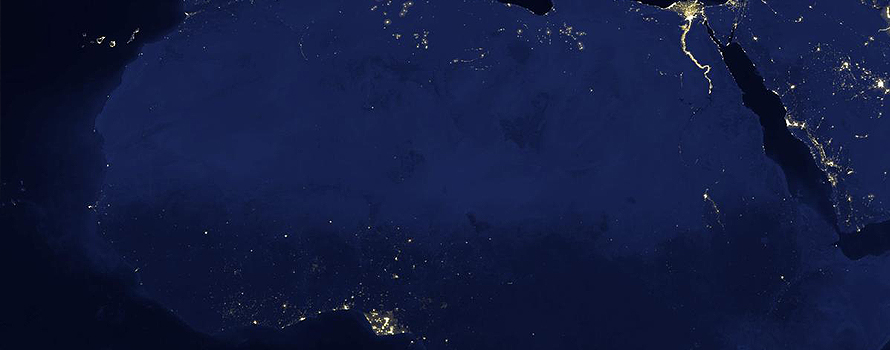
▲The area of light at the bottom of the satellite image corresponds to the oil facilities of the Niger Delta [NASA]
article / Baltasar Martos
The fierce dispute over energy resources at the mouth of the Niger River in southern Nigeria has been one of Africa's most high-profile conflicts for decades. The marginalization, confinement, and impoverishment of the Ogoni and Ijaw – the name given to the ethnic tribes in the coastal provinces of Rivers, Bayelsa, and Delta – have contributed to an escalation of tension between locals and the federal government.
In order to understand the underlying problem, it is first necessary to take a brief look back in time and discern the three chronological stages that have shaped the current panorama of the conflict, namely: the beginning of oil exploitation, the hegemony of Royal Dutch Shell and the post-independence period.
In 1903, in the southern coastal region of present-day Nigeria, which became a British protectorate (1901) and later a colony (1914), a large deposit of minerals and hydrocarbons, such as coal, bitumen, oil and natural gas, was discovered. The British company Nigeria Properties Ltd. then began oil exploration and extraction, reaching a production of 2,000 barrels per day in 1905. Later, in 1937, and after the succession of several oil companies, the Anglo-Dutch multinational Royal Dutch Shell acquired a monopoly on the exploration of oil sources – and, to a lesser extent, other hydrocarbons – reaching a number of fees production of 5,000 barrels per day.
Three decades later, following independence and the official establishment of the Federal Republic of Nigeria (1960-1963), the military government of Yakubu Gowon embarked on a policy of nationalization and acquisition of foreign firms in the country, forcing them by legal mandate to re-register through joint ventures with state-owned enterprises. In this way, he managed to transform this activity into the main strategic sector for the Economics of the country. In addition, taking into account the entrance Nigeria joined OPEC in 1971, it is not surprising that the federal government currently owns 60% of the capital stake in practically all the oil companies in operation, occupying an important role as a leader in the country. partner majority.
On the contrary, the civilian population in the area has result The big loser. The ethnic minorities most affected by prospecting, extraction and commercialization activities – with the consequent enrichment for some and environmental pollution for others – have been demanding the attention of the government and demanding legislative measures for environmental and social protection for decades [1].
On the one hand, locals demand "environmental justice," defined by the U.S. Environmental Protection Agency as "fair treatment and meaningful participation in political decision-making processes about activities that affect the natural environment of all peoples, regardless of race, color, culture... concerning the implementation and enforcement of environmental laws, regulations, and policies."
The Ogoni and Ijaw are peoples dedicated mainly to agriculture and fishing as a means of subsistence, for whom the natural environment is the only and main one source of wealth. They are protesting against the long-standing collusion (since independence) between the government and multinational oil companies, calling them both "expropriators and polluters" and blaming them for the impoverishment of the region and the deplorable state of the rivers that flow through it. They also claim their rights to obtain and use, for their local communities, the corresponding share of the profits derived from the exploitation of energy deposits because they are traditionally located on a large pocket of crude oil [2].
Corruption, clientelism and the structural weakness of the government, added to its great interest in and dependence on this sector – which has come to be a benefit for the Economics The national increase of up to 55% of GDP in the mid-1990s according to World Data Bank statistics – makes it extremely difficult for the president and his cabinet to agree to address the needs of these communities in the Niger River Delta. The growing protests led to a real conflict, which began in the last decade of the last century, pitting the civilian population against the federal government in collusion with the multinationals. This confrontation has taken two forms, one peaceful and the other violent, and has attracted the media attention of a large part of the international community.
International Attention
On the other hand, the conflict in the Niger Delta is a clear case of globalization, since oil extraction involves a set of transnational forces, non-state actors and interdependent processes. Fruit of the prolonged status In response to the discontent of the indigenous tribes of the area, two movements have grown in denunciation of profit by a government that barely invests in the development of this region of the country, mired in poverty and poverty. withdrawal, and degraded by the exploitation of its natural resources.
On the one hand, there is the Movement for the Survival of the Ogoni People (MOSOP), created in the wake of protests in the 1990s and used as a model for other civil associations to publicly express their dissatisfaction with the negative impacts of the oil industry on the quality of life of the inhabitants of the area. This organization, started by writer Ken Saro-Wiwa and composed mainly of academics and teachers, peacefully denounces the joint actions of the government and the corporations installed in the area and advocates for the civil human rights of the Ogoni to decent housing conditions, environmental justice and legislation that respects and protects them from environmental threats.
On the other hand, there is the Movement for the Emancipation of the Niger Delta (MEND). It is made up of an amalgam of armed youth groups organized into local resistance militias, whose goal The main one is to fight for control of the oil benefits for the ethnic minorities settled in the area. This is a military branch of MOSOP that has already sabotaged oil pipelines and kidnapped foreign factory workers, demanding ransom from the government on several occasions.
The most important thing about both movements is that they have caught the attention of a large number of people. issue local and international non-governmental organizations that have partnered with them and have begun to promote and to make their cause visible to the entire international community. Amnesty International, Human Rights Watch and the Niger Delta Human and Environmental Rescue Organization are some of the many organisations that have opened a space for work devoted solely and exclusively to the question of the Niger Delta. They advocate worldwide for the defense of the environmental rights of communities affected by the exploitation of resources and the pollution of the natural environment. They have also been able to partner with transnational media and human rights networks to spread the status from conflict to a global audience.
The joint denunciation of the "alleged violations of human and environmental rights against the members of the Ogoni ethnic group of the Niger Delta" has resonated worldwide and has obtained a significant sum of economic aid aimed at the re-establishment of the settlements from which the indigenous peoples had been displaced, as well as the promotion of environmental justice. the protection and guarantee of the civil rights of locals to take advantage of the natural wealth of their area, the continuation of their economic activities and the safeguarding of their environment. The global impact of this conflict is likely to have an impact on how similar conflicts are resolved.
[1] Obi, Cyril. "Insights from the Niger Delta", Young, Tom. Readings in the International Relations of Africa. Indiana University Press, 2016.
[2] Botchway, Francis N., ed. Natural Resource Investment and Africa's Development. Edward Elgar Publishing, 2011.
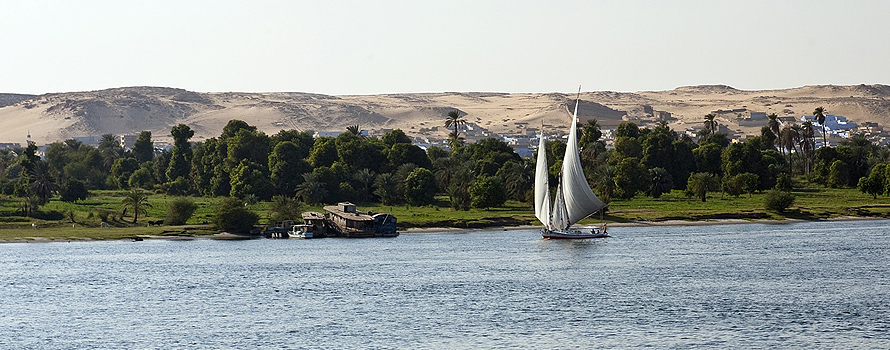
▲Lower Nile River, Egypt [Pixabay]
ANALYSIS / Albert Vidal [English version]
Disputes over control of rivers, lakes, and, in particular, final, are particularly alive today and will intensify in the near future, since, according to the World Health Organization, by 2025 half of the world's population will live in water-scarce areas. Currently, the countries with the most water reserves are Brazil, Russia, the United States, Canada, China, Colombia, Indonesia, Peru, India and the Democratic Republic of Congo. Most water available It is found underground, concentrated in aquifers, or surface water (rivers and lakes). The aquifers with the largest reserves are the Nubian Sandstone Aquifer System (under the Sahara Desert), the Great Artesian Basin (in Australia), and the Guarani Aquifer (in South America). On the other hand, there are a number of rivers in the world that are of exceptional importance, simply because of the enormous amount of population and economic activity that depend on them. Problems arise when these rivers are not part of a single State, but are contiguous or transboundary rivers, and that leads to disputes between some States.
Flashpoints in Asia
Asia is being particularly affected by this problem. There are currently various tensions revolving around water control. One of the most significant cases concerns the use of water from the Indus River, which supports 300 million people and has caused tensions between Pakistan and India. This river is a resource vital for both countries. With the independence of Pakistan, the Indus became a source of disputes. This was addressed by the Indus Water Treaty (1960), which gave India the three eastern tributaries (the Sutlesh, the Ravi and the Beas) and Pakistan the three western rivers (the Indus, the Jhelum and the Chenab). But due to water scarcity, Pakistan has recently protested against the construction of dams on the Indian side of the river (in Indian-administered Kashmir), which restrict the water supply to Pakistan and reduce the flow of the river. India, for its part, defends itself by saying that such projects are covered by the Treaty; Still, tensions don't seem to be abating. For this reason, Pakistan has order the World Bank to appoint the president of an international arbitration tribunal in order to resolve the dispute. This problem of water reserves is at the heart of the confrontation in Kashmir: without an adequate supply, it would not take long for Pakistan to become a desert.
|
Watersheds in Central Asia [Wikimedia Commons–Shannon I] |
Indus River Basin [Wkiwand] |
In Asia, there is also the dispute over the Mekong River, which runs through Cambodia, Vietnam, Laos and Thailand. This conflict revolves around the construction of dams by various countries, as well as the exploitation of the resources provided by the Mekong River. Eleven dams along the river are planned, which would produce a large amount of electricity and be beneficial to some countries, but in turn could threaten the food security of millions of people. The affected countries (Cambodia, Vietnam, Laos and Thailand) formed the Mekong River Commission (MRC) in 1995. This commission was formed in order to promote dialogue and promote the fair and equitable use of the river's waters. The MRC has mediated between countries several times; in 2010 for the construction of a dam by Laos and Thailand, and the same status It happened in 2013. Talks have not been result and there are fears for the lives of millions of people, who could be affected if the conflict escalates.
The ineffectiveness of this body could be summed up as follows: decisions on the construction of dams are made directly without submitting them to the MRC, and construction companies put such pressure on governments that it is very difficult to carry out environmental impact assessments. Moreover, since it is not a binding treaty, members end up ignoring its guidelines and preferring to "cooperate" in a broad sense. In any case, the talks are continuing although, at the moment, the MRC does not seem able to assume the weight of the negotiations. This gives the conflict an uncertain and dangerous future.
A third source of friction is the ex-Soviet region of Central Asia. During the Cold War, these regions shared resources as follows: the mountainous republics (Tajikistan and Kyrgyzstan) had abundant water, and supplied it to the downstream republics (Kazakhstan, Turkmenistan, and Uzbekistan) to generate electricity and irrigate crops. In turn, the downstream republics supplied gas and coal to Tajikistan and Kyrgyzstan during the winter. But when the USSR collapsed, all that changed and there began to be water shortages and power cuts, as these independent countries decided to stop sharing water and energy. As the International Crisis Group think-tank proclaims, "the root of the problem lies in the disintegration of the system of sharing sources imposed by the Soviet Union in the region until its collapse in 1991."
Thus, Kyrgyzstan and Tajikistan have decided to build hydroelectric dams on the Syr Darya and Amu Darya rivers to produce their own energy and thus cope with the constant blackouts (potentially lethal in winter). This, of course, will limit access to water for millions of people living in the other three republics, which has led to small-scale conflicts. Threats have also abounded, such as that of Uzbek President Islom Karimov, who in 2012 said the following: "Water resources could become a future problem that could lead to an escalation of tensions not only in our region, but across the continent"; He added: "I won't name specific countries, but all of this could deteriorate to the point where the result It wouldn't just be a confrontation, it would be wars." Despite the threats, the projects have continued on their way, and therefore an increase in tension in the region can be expected.
|
The Nile Course [Wikimedia Commons–Yale Environment 360] |
Mekong River Basin [Wikimedia Commons–Shannon I] |
Control of the Nile
The Nile River appears as source of tension between various African countries. To understand the existing problem, we must go back more than a century. As early as 1868, Egypt attempted to occupy Ethiopia in order to gain control of the Nile. In 1929 , agreements were signed during the colonial era, in which the waters of the Nile were divided. In these agreements (which were reaffirmed in 1959), Egypt obtained most of the water for its use, while Sudan obtained a small share. The remaining 9 countries in the Nile basin were removed from the treaty. At the same time, Egypt was allowed to build projects on the Nile River while the rest of the riparian countries were forbidden to do the same without Egypt's permission.
In 1999, the Nile Basin Initiative was created: a commission charged with organizing a fair distribution of the Nile's water and resources. But as it did not have the expected effect, in 2010 the agreement of Entebbe (for Ethiopia, Rwanda, Uganda, Kenya, Tanzania and Burundi). This agreement, deeply disputed by Egypt and Sudan, allows riparian countries to build dams and other projects, thus breaking the restrictions imposed by colonial treaties. Moreover, this has shifted the balance in the region, as Egypt and Sudan have lost their monopoly on the Nile's resources.
It is vital to understand the status of these actors. The Nile rises in several countries, and ends up passing through Sudan and Egypt to flow into the Mediterranean Sea. Egypt, in particular, is a country totally dependent on the Nile River. It receives more than 90% of its fresh water from this river, and its industry and agriculture need the Nile to survive. Until a few years ago, thanks to colonial treaties, Egypt had exercised a monopoly on the use of water; But recently, the status it's changing.
Therefore, the confrontation has basically arisen between Egypt and Ethiopia (where the Blue Nile is born). The latter is a country with more than 100 million inhabitants, which in 2011 had a project of dam construction: the Grand Ethiopian Renaissance Dam (GERD). With an investment of 4,700 million dollars, this dam would solve Ethiopia's energy deficit, and would eventually turn this country into a net exporter of electricity (it would produce 6,000 MW per year). The downside is that the dam will be fed with water from the Blue Nile, a tributary of the Nile River. The danger of evaporation of more than 3 trillion cubic meters per year and the reduction of the flow rate to fill the reservation it could catastrophically affect Egypt. In addition, the dangers arising from the overuse of water are compounded by population growth and the demand for better redistribution of water among riparian countries.
This issue has led to tensions between the two countries: in 2010 an email from a senior Egyptian commander was leaked to Wikileaks stating: "We are discussing military cooperation with Sudan against Ethiopia, with plans to establish a base in Sudan for Egyptian Special Forces with a view to attacking the country."project GERD." Egypt also thought of preparing support for proxy rebel groups in Ethiopia, to destabilize the government. In any case, we must bear in mind that Egypt has always tended to use aggressive rhetoric towards all issues related to the Nile (source of life, the engine of its Economics), but in reality the nation of the pharaohs is not in a position to launch armed actions, since its domestic problems have worn down the country, thus losing its position of clear predominance in the region.
But not all the future is so bleak. In March 2015 , a agreement A preliminary agreement between Egypt, Ethiopia and Sudan on the Renaissance Dam and the sharing of water, accepting Ethiopia's right to build the dam without damaging the water supply of Egypt and Sudan. Although these two countries are alarmed at what will happen once the reservation This is a first step towards an era of cooperation. Abdel Fattah el-Sisi himself (Egypt's president) said at the convention: "We have chosen to cooperate and trust each other, for the sake of the development". Finally, in November of the same year, it was not possible to approve an independent commission of inquiry to look at the consequences of the dam, since after Sudan accused Egypt of using part of the Sudanese quota, a war of declarations began, which jeopardized the fragile cooperation between these countries.
Such cooperation in the field of water resources will have a beneficial impact in many other areas and, although a failure of the negotiations cannot be ruled out, it is likely that thanks to the construction of the GERD and regional cooperation, the ties between these countries will become stronger, which can mark the starting point of a new era of peace and peace. development in this region.
A case of cooperation: the Paraná
The Paraná, a border and cross-border river that rises in Brazil and crosses Paraguay to flow into the Rio de la Plata, is a very different example. Its basin is linked to the Guarani Aquifer (one of the largest water reserves in the world), and that is a guarantee of the large volume of water that this river has throughout the year. For this reason, many hydroelectric power plants have been built, taking advantage of waterfalls and rapids. On the other hand, the importance of this river on a political and economic level is core topic; the Paraná and the La Plata Basin feed the most industrialized and populated area of South America. That is why cooperation has been particularly important.
|
The Paraná, central axis of the La Plata basin [Wikimedia Commons–Kmusser] |
The Itaipu Dam (the second largest in the world and the first in world production) is a binational dam, built by Paraguay and Brazil. It was the result of intense negotiations (not always easy), and now produces an average of 90 million MWh (megawatt-hours) per year. Even so, there was not always concord between Paraguay and Brazil: in 1872 disputes over borders began. After many useless agreements, it was agreed to flood the disputed territories and create a hydroelectric dam. The reluctance that the initiative aroused in Argentina, because the regulation affected the flow that, downstream, would continue to the Río de la Plata, resulted in a three-way pact in 1979. In 1984 the dam became operational. Today it is administered by the Itaipu Binational Entity, a business public-private between Paraguay and Brazil, and supplies more than 16% of the total energy consumed in Brazil, and more than 75% of that consumed in Paraguay. Although the environmental impact was great, Itaipu has promoted campaigns to maintain biological reserves and protect fauna and flora. In addition, it has reforested large areas around the reservoir, and ensures the quality of the water.
This is a clear example of the benefits that can be brought by a reasonable and shared use between countries that decide to cooperate. Thus, countries that are parties to some of the current controversies should look to these examples of behaviour which, although not perfect, can be learned a great deal from them.
Although water can be the source of disputes between peoples and nations (such as the cases cited), it also offers very advantageous opportunities (what happened on the Paraná River or the Nile) for countries that manage to cooperate. This cooperation, initiated to avoid conflicts over water, can lead to new stages of harmony and strengthen trade, political and security relations. Is core topic, then, to show how an attitude of willingness to negotiate and cooperate will always have positive consequences for countries that share river flows.
Showing the range 21 - 27 of 27 results.

